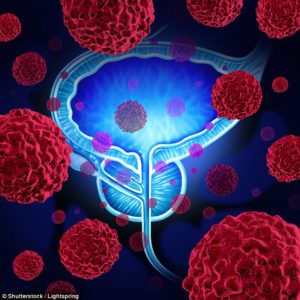The body’s natural cancer-fighting proteins could be fueling the spread of cancer, scientists have discovered.

The body’s natural process that removes dead and dying cells actually fuels the spread of cancer to bones and other organs due to a pro-inflammatory protein that is released
A new study focused on prostate cancer to find that the body’s process for removing dead and dying cells causes those harmful cells to spread to bones and other organs by increasing inflammation.
The process’s negative effect in metastatic prostate cancer cells has been poorly understood, but now researchers have discovered a breakthrough by pinpointing the protein.
This understanding could help researchers develop drugs to block the harmful tumor growth in prostate and other cancers, while still allowing the body to clear out the dying cells.
The process of removing cellular debris is called efferocytosis, and it is a critical and normal function in both healthy people and those with cancer.
These ‘cellular house cleaners’ are called phagocytes, which are known to be the first immune system responders to resolve infections by foreign invading organisms.
 The new research from the University of Michigan found that as prostate cancer cells spread, the process to clean them out produced the pro-inflammatory protein CXCL5.
The new research from the University of Michigan found that as prostate cancer cells spread, the process to clean them out produced the pro-inflammatory protein CXCL5.
The protein is not usually released during cellular clean-up in healthy situations but does stimulates the growth of tumors.
Experiments were conducted on blood samples from patients with prostate cancer that had spread. It found their level of inflammatory CXCL5 were higher.
This was compared to others whose disease had remained in the prostate gland.
The breakthrough published in the Journal of Clinical Investigation could have implications for some other forms of cancers including breast, researchers said.
Before the human experiments, the researchers induced cell death in mouse bone tumors.
When the CXCL5 protein was blocked in the lab, the animals’ tumor progression was hindered.
Some types of prostate cancer grow slowly. In some of these cases, monitoring is recommended due to the body’s ability to remove the dead and dying cells.
Other types are aggressive and require radiation, surgery, hormone therapy, chemotherapy or other treatments.
When prostate cancer spreads it often appears in bone, at which point it becomes incurable.
Dr Hernan Roca, of Michigan University, said the goal of any cancer treatment is to kill tumor cells, but paradoxically the body’s natural process for removing dead and dying cells can cause tumors to grow – a phenomenon that is not understood.
Now Dr Roca and colleagues have identified the pathway by which this occurs.
It opens the door to targeting the protein with medications that block it, halting the potentially fatal spread of the disease while still allowing the body to clear out dying cells.
Dr Roca said: ‘The challenge for the future is to understand how to treat these patients to avoid this pro-inflammatory and tumor promoting response while still preserving the essential function of cell removal.’
In the US, about one man in seven will be diagnosed with prostate cancer during his lifetime.
Prostate cancer is the third leading cause of cancer death in American men, behind lung cancer and colon cancer.
It can be a serious disease, but most men diagnosed with prostate cancer do not die from it. More than 2.9 million men in the United States who have been diagnosed with prostate cancer at some point are still alive today.
Written by Kayla Brantley for and published by The Daily Mail ~ November 27, 2017.
 FAIR USE NOTICE: This site contains copyrighted material the use of which has not always been specifically authorized by the copyright owner. We are making such material available in our efforts to advance understanding of environmental, political, human rights, economic, democracy, scientific, and social justice issues, etc. We believe this constitutes a ‘fair use’ of any such copyrighted material as provided for in section 107 of the US Copyright Law. In accordance with Title 17 U. S. C. Section 107, the material on this site is distributed without profit to those who have expressed a prior interest in receiving the included information for research and educational purposes. For more information go to: http://www.law.cornell.edu/uscode/17/107.shtml“
FAIR USE NOTICE: This site contains copyrighted material the use of which has not always been specifically authorized by the copyright owner. We are making such material available in our efforts to advance understanding of environmental, political, human rights, economic, democracy, scientific, and social justice issues, etc. We believe this constitutes a ‘fair use’ of any such copyrighted material as provided for in section 107 of the US Copyright Law. In accordance with Title 17 U. S. C. Section 107, the material on this site is distributed without profit to those who have expressed a prior interest in receiving the included information for research and educational purposes. For more information go to: http://www.law.cornell.edu/uscode/17/107.shtml“
